
5 ways to teach your kids food literacy this summer.
“You mean potatoes don’t come from a box?”
That was the shocked question a nine-year-old asked me once during a supermarket nutrition tour. I distinctly remember her holding a potato and looking at it as though she had not seen one before. That encounter shocked me as I wasn’t expecting such a lack of knowledge of an everyday vegetable like a potato. But over the course of many other supermarket nutrition, I heard many similar questions from children such as: “What’s a cabbage?” “I thought yams were only fries?” and “How do you open an egg?”
The questions are sweet and would be comical if it weren’t so telling about how many children are disconnected from the food on their plates. They don’t know where the food comes from, how it’s prepared, or how to choose food that is good for them.
Food literacy means having the knowledge, skills and attitudes needed to choose, grow, prepare and enjoy food to best support one’s health, community and the environment. Food literacy includes necessary life skills that all of us must have if we are to be healthy. If we don’t know how to choose foods that are good for us or how to prepare them, we can rely heavily on convenience or pre-prepared foods that are high in fat, sugar or salt, and our health will suffer. In this case, we are also more likely to develop heart disease, diabetes or obesity later on in life.
Practically speaking, we are food literate when we know how to choose foods and meals that are good for our health, well-being and safety. Also, when we know what a healthy diet is as well as how to read and understand food labels. Knowing how to store, prepare food safely and how to budget for food shopping are also part of being food literate. Of course it’s also important to apply what we know.
Early childhood through the middle school years is the ideal time for children to learn about food and to gain skills needed in choosing, handling, preparing and budgeting for it. While both school and home provide opportunities to become food literate, evidence suggests food learning opportunities at home are more effective in the long term in helping children gain the knowledge and the skills needed to become food literate.
Why not get started this summer helping your school-aged children build their food literacy life skills.
Here are five simple tips to try:
- Eat together. Children who eat with their parents eat better food than if they were on their own, even if it’s only one meal per day. Make mealtime an electronics-free zone. Electronics will take away precious family time and the opportunity to connect and talk about your child’s day.
- Help kids meal plan. Have your grade-schooler help you plan a few suppers in a week using the Eat Well Plate. The Eat Well Plate shows food group proportions and encourages you to make half your plate vegetables and fruit.
- Let your child help with cooking. Children can measure, stir, mix and even chop foods, depending on their age. Teach your child to follow a recipe and you will also be teaching them math and reading skills. My child’s fractions math unit became real while using measuring cups and spoons.
- Invest in a slow cooker. Slow cookers and instant pots are helpful in stretching your food dollar as well as in preparing very healthy meals with very little effort. Try making a hearty lentil soup or chilli. Children love throwing things in the pot and watching it come out as dinner.
- Plant a garden this summer. Children learn about food production while they help tend to the garden by watering, weeding and harvesting the ripe veggies. If you can’t plant a full garden, try just a couple easy vegetables or herbs. If you don’t have a back yard, many veggies and herbs grow happily in a planter on a sunny patio. Some veggies grow easily and without much attention, such as lettuce, kale, spinach, carrots, peas, beans, even cherry tomatoes.
By trying one of these tips, you’ve taken a step towards helping your child gain life skills that will help them to become food literate and support their health better. And ensure they never have to ask in a grocery store if potatoes come in a box.
